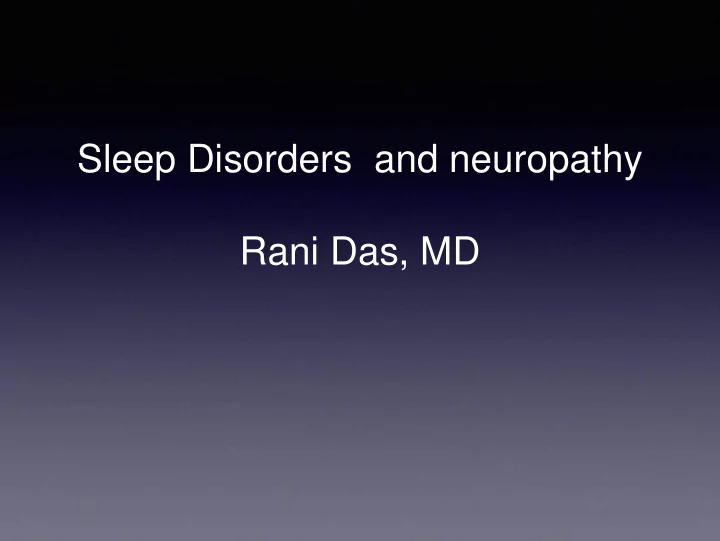

Sleep Disorders and neuropathy Rani Das, MD
When did sleep disorders worsen in time? 1879!
Disturbed sleep can worsen your pain. It's a vicious cycle: pain prevents you from sleeping, and not sleeping makes the pain worse.
• The diagnosis and treatment of neuropathic pain may be complicated by comorbid conditions such as sleep disturbances, depression, and anxiety • Sleep onset insomnia can occur due to anxiety,sleep fragmentation and disruption can be due to chronic pain which can lead to decreased tolerance for neuropathic pain
Obstructive Sleep Apnea • Common symptoms are snoring and having pauses in breathing in sleep • Symptoms include tiredness, daytime sleepiness, feeling tired after sleeping and morning headaches, arousals at night • Graded in severity as AHI ( apnea hypopnea index) • Treatment includes CPAP( Continuous positive airway pressure) • Risk factor for CAD, Stroke,HTN,CHF( Sleep Heart health Study 2007-10)
Clinical Journal of Pain: October 2006 - Volume 22 - Issue 8 - pp 681-685 Zelman etall This study evaluated sleep impairment associated with painful • diabetic peripheral neuropathy (DPN), a neuropathic pain condition. Sleep is of critical concern for DPN because sleep impairment and its comorbidities may influence type 2 diabetes • Sleep Apnea can cause worsening of Diabetes and metabolic syndrome which can cause progression of neuropathy • It was found that insulin resistance is related to the severity of sleep apnea ( journal of sleep medicine March 93)
• . It is assumed that recurrent intermittent hypoxaemia (decreased oxygen level in blood)in OSA is an independent risk factor for axonal damage of peripheral nerves.( Case control study J Neurol Neurosurg Psychiatry 2001) • Dysautonomia seen in autonomic neuropathy can cause arrhythmias related to OSA
• Neuropathy can cause secondary Restless Leg Syndrome urge to move your legs usually accompanied by • uncomfortable leg sensations • symptoms are partially or totally relieved by movement. • symptoms begin or worsen during rest such as lying or sitting. • symptoms are worse in the evening or night
Neuropathy meds and sleep • opioids, and methadone in particular, have been found to be associated with a high rate (75%) of obstructed breathing and central apnea in patients with chronic pain. • Tricyclics suppress REM and decrease sleep latency • SSRI/SNRI drugs like CYMBALTA suppress REM sleep • Gabapentin ,lyrica increase N3 Sleep and cause less sleep fragmentation
Insomnia • Difficulty in falling asleep or staying asleep • Difficulty falling asleep can be related to anxiety or just inability to relax • Cognitive behavioral therapy helps , Yoga Nidra • Trying to go to sleep makes insomnia,anxiety worse...your goal should be never to make yourself go to sleep...only to relax • Do not spend too much time in bed ( no more than 5-6 hrs) • Don't watch the clock • Regular bed schedule • Difficulty staying asleep could be due to pain , or other sleep disorders
Insomnia • If you do not fall asleep in 15-20 mts, go to another room • Try progressive muscle relation.breathing techniques, sit in a easy chair and turn on soft light to read • Avoid the computer or media • You may like to play soft music • Your goal is to do something quiet and relaxing
Sleep Habits that can help • Stick to a regular bed time routine • Get up at same time every day • Avoid caffeine and alcohol • Get daily exercise • Make your bedroom quiet and dark • Pets to sleep outside the bedroom if disruptive • Keep the temperature cool ( 60-67 degrees) body temperature drops to initiate sleep • Avoid electronics before bedtime..orange filter sunglasses can help filter disruptive blue light
Sleep Hygiene • Avoid napping during the day. It can disturb the normal pattern of sleep and wakefulness. • Avoid stimulants such as caffeine, nicotine, and alcohol too close to bedtime. While alcohol is well known to speed the onset of sleep, it disrupts sleep in the second half as the body begins to metabolize the alcohol, causing arousal. • Exercise can promote good sleep. Vigorous exercise should be taken in the morning or late afternoon. A relaxing exercise, like yoga, can be done before bed to help initiate a restful night's sleep. • Food can be disruptive right before sleep. Stay away from large meals close to bedtime. Also dietary changes can cause sleep problems, if someone is struggling with a sleep problem, it's not a good time to start experimenting with spicy dishes. And, remember, chocolate has caffeine.
• Ensure adequate exposure to natural light. This is particularly important for people who may not venture outside as frequently as children and adults. Light exposure helps maintain a healthy sleep-wake cycle. • Establish a regular relaxing bedtime routine. Try to avoid emotionally upsetting conversations and activities before to go to sleep. Don't dwell on, or bring your problems to bed. • Associate your bed with sleep. It's not a good idea to use your bed to watch TV, listen to the radio, or read.
• Have light exposure in daytime .Make your room dark at night. Do not take naps in the day • ( natural sunlight and dark ness effects sleep clock in hypothalamus (SCN) which regulates melatonin by pineal gland ) to establish your circadian /sleep rhythm • Consider timing of drugs like Gabapentin at night • Talk to your doctor about over the counter meds which may effect your sleep
Thank You
Recommend
More recommend